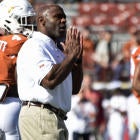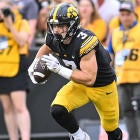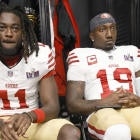From the time Charlie Strong was hired at Texas in January 2014, he spoke of the pressure he felt on behalf of other black coaches.
"We can't fail here," Strong told Sporting News in 2015. "There are too many people counting on us."
Strong, who was fired early Saturday after a three-year record of 16-21, did fail. There is no getting around the facts.
Outside chatter contributed to Strong panicking and demoting coordinators midseason two years in a row. He changed offensive philosophies on the fly. His special teams managed to get three extra points blocked in one game. He became the first Texas coach with three straight losing seasons since 1936-38. Perhaps most damaging, he lost to 1-9 Kansas while Texas administrators were reportedly intent on trying to retain him.
Strong was the first black football coach at Texas, which is one of the most prestigious jobs in the country. Not since Tyrone Willingham lasted three years at Notre Dame with a 21-15 record had there been such a high-profile job with a black head coach as Strong at Texas. Longhorns players appeared to overwhelmingly love Strong, who said he thought his job status placed too much pressure on them.
Strong knew he was carrying a mantle for black coaches who opened doors for him and those he hoped to help. If Strong had won big at Texas, his success might have resulted in more interviews and jobs for other minorities.
"There are a lot of people that paved this way for me," Strong told The Undefeated in a recent article. "You think about what a lot of people had to go through, and not only coaches, just a lot of African-Americans, what they had to go through for us to be in the position that we're in."
Strong made his bed with mistakes at Texas. But race is very much a part of his story that can't be ignored as he's fired.
In college football, 54 percent of the players are black and 88 percent of the coaches are white. Entering this season, only 12 of the 128 FBS coaches were black, down from 17 in 2011, according to the Institute for Diversity and Ethics in Sport. There was also one Latino coach and two Asian-American or Pacific Islander coaches this season.
Advocates who are pushing for minorities to get more interviews for head-coaching jobs are closely watching what happens next with Strong.
They remember Will Muschamp at Florida, Charlie Weis at Notre Dame and Ron Zook at Florida. They all failed miserably at one high-profile job only to get another head-coaching position fairly quickly (at South Carolina, Kansas and Illinois, respectively). There's also Ed Orgeron, who similarly failed miserably as a first-time head coach at Ole Miss and -- after a decade as an assistant and interim coach -- worked his way back to one of the most prestigious jobs in the country at LSU. They're all white. (Willingham got another job after Notre Dame and went 11-37 at Washington in four years.)
What jobs open up this offseason and where Strong wants to coach will be factors determining whether he's a head coach in 2017. Another factor: Presidents and athletic directors considering Strong had a 23-3 record in his final two years at Louisville after cleaning up problems he inherited.
"The question isn't about him falling [at Texas], it's will he get an opportunity somewhere else?" said Ohio State athletic director Gene Smith, who believes ADs must recommit themselves to include minorities in the interview process. "He did a phenomenal job at Louisville. He did a phenomenal job at Texas in some areas because of what he cleaned up. He didn't win, but he did improve the culture."
Black coaches/managers have won championships in the NBA (first time in 1966), college basketball (1984), Major League Baseball (1992) and the NFL (2007). It's never happened in college football.
"That is interesting," Smith said. "If we were in the 1980s, I'd probably say [Strong's firing] could hurt other coaches getting jobs. But I don't think that's true today. I think there's a large number of presidents and athletic directors who are looking for the right person. If we could come up with strategies to make sure minority candidates get in front of the decision makers, my belief is there would probably be more opportunities and there would be some who would be successful."
Current black coaches at prominent programs include James Franklin, who has Penn State flirting with the College Football Playoff; David Shaw, who coaches one of the most consistent programs in the country at Stanford; and Kevin Sumlin, who is the seventh highest-paid coach in the country and facing scrutiny with a 15-17 SEC record over the past four years at Texas A&M. Navy's Ken Niumatalolo, who is the second person of Polynesian descent to be an FBS head coach, has the Midshipmen in the top 25 again this year.
Some organizations that tried to hold universities accountable for diverse hiring practices are disappearing. The Black Coaches Association (BCA) ran out of funding and no longer exists, restructuring into Advocates for Athletic Equity, which shut down this fall.
One of the last sports organizations still pushing for minority opportunities is the National Association for Coaching Equity and Development. It's led by Merritt Norvell, a former Michigan State athletic director whose son, Jay, coached Texas wide receivers under Strong and called plays before getting demoted and leaving.
The lack of minority head coaches is "about comfort and white privilege," Merritt Norvell said. "You can probably add in there the coaching tree. A guy who played with you or worked with you 15 years ago calls up and says, 'I've got a hot candidate and you should hire him.' You end up hiring a guy. It might work, it might not. That's about comfort. They do it because they can do it."
Universities are bound by federal law, Title VII of the Civil Rights Act of 1964, to not discriminate when hiring. However, athletic departments often find a way around having a diversified pool, unlike other job openings at universities, Norvell said.
"ADs call the HR department when they have a hot candidate and they ask for a waiver," Norvell said. "What the waiver does is get them around Title VII because they can qualify it as an emergency hire and then they don't need a diversified pool. That's how minority candidates get excluded from the process. They say they're an equal-opportunity employer. We're saying, 'Do what you're leading the public to believe. Make it a fair process.'"
Norvell has pushed for a Rooney Rule -- many people want it called the Eddie Robinson Rule after the legendary Grambling coach -- that's similar to the one used in the NFL. The Rooney Rule mandates NFL teams to interview a minority in the hiring process. The NCAA has said there's probably no way it can legally implement such a rule since hiring laws vary by state.
"I've been a Division I athletic director," Norvell said. "I know if you want to get it done, all you've got to do is do it."
Smith said Norvell is "100 percent right" about waivers that athletic departments use to quickly hire the coach they want without a diverse pool of candidates.
"That's why I'm not a big proponent of trying to drive this through with legislation," Smith said. "I think it would be very difficult to legislate. I'm not so sure you need that. Several years ago, we made a commitment as ADs at our AD association convention that whenever we have an opening, we'd be sure to include minorities in the interview process. That ran for a while and worked for maybe four or five years. Then it just kind of stopped and we didn't stay true to that commitment. The presidents could hold each other accountable like we did as ADs during that period of time."
Jed Hughes, vice chairman of the search firm Korn Ferry, said the pipeline for minority candidates who are qualified to be head coaches is unfortunately limited.
"If you're not a coordinator, it's going to be tough to be a head coach," Hughes said. "When you think about that as it relates to a person of color, you have to think about who is sitting in those jobs. Dino Babers at Syracuse could be a very attractive candidate. But there aren't many.
"The issue is who's taking the time to help develop persons of color to be high-quality coaches. It takes an effort. It appears that when a person of color gets a head coaching job, he tries to at least bring more persons of color onto his staff to give them the opportunity. At the end of the day, they have to win. Charlie came into a tough situation with changes at president and athletic director."
Texas paid Korn Ferry approximately $267,000 to help in the search that hired Strong in 2014.
"When you're a first-time black head coach in an area where there's still pockets of the deep, old times, there's probably a part of the fan base and part of the major donors that didn't want to accept him," Hughes said.
Immediately after Strong was hired, longtime Texas booster Red McCombs described the decision as a "kick in the face." McCombs had lobbied for Texas to hire former NFL coach Jon Gruden.
"I don't have any doubt that Charlie is a fine coach," McCombs told ESPN 1250 San Antonio in January 2014. "I think he would make a great position coach, maybe a coordinator. But I don't believe [he belongs at] what should be one of the three most powerful university programs in the world right now at UT-Austin. I don't think it adds up."
Said Hughes: "Red wanted Jon Gruden. We called Jon Gruden. In fact, I was in the president's office when it happened. Jon Gruden said he wasn't interested. We called Red back. Red said he didn't even remember we called him."
Hughes said if NCAA presidents wanted to enforce a Rooney Rule for college sports, "they could get it done."
It's not just college football that lacks minorities in leadership roles. A 2014-15 NCAA survey found that fewer than 10 percent of athletics directors are black, minorities hold only 13 percent of leadership positions in athletic administrations, and only 40 percent of head coaching jobs in women's sports are held by women.
This fall, the NCAA encouraged all Division I, II and III presidents and chancellors to sign a diversity and inclusion pledge. Schools that have signed the pledge can be found here.
The pledge states:
"Consistent with our mission and values, [NAME OF NCAA MEMBER HERE], a member institution of the National Collegiate Athletic Association (NCAA), pledges to specifically commit to establishing initiatives for achieving ethnic and racial diversity, gender equity and inclusion with a focus and emphasis on hiring practices in intercollegiate athletics to reflect the diversity of our membership and our nation.
"We recognize and value the experiences individuals from diverse backgrounds bring to intercollegiate athletics. To that end, we will strive to identify, recruit and interview individuals from diverse backgrounds in an effort to increase their representation and retention as commissioners, athletics directors, coaches and other athletics leadership positions. As part of this commitment, we will also engage in a regular diversity, inclusion and equity review to inform campus policy and diversity initiatives.
"We understand this to be a collective responsibility we owe to student-athletes, staff, our athletics programs and the entire campus community."
Norvell said his organization pushed the NCAA to create this pledge. The language wasn't exactly what he wanted, but he believes the pledge represents progress if schools actually abide by it.
"Now that you've signed this pledge, how are you going to make it work?" Norvell said. "You've got a change in attitude in this country, and I think some of these presidents are going to be pressured by state legislatures to forget about diversity hiring. That's going to be a serious problem. All we're asking is when it comes to the final candidates, interview a qualified minority candidate and don't just jump on the next hot coach you think can beat Alabama."
With Strong and Purdue's Darrell Hazell out of jobs, college football is down to 10 black coaches at the moment. Where the number lands will depend on this year's coaching carousel.
"All these presidents signed this pledge," Norvell said. "We'll see whether or not these people are really serious about it."






















